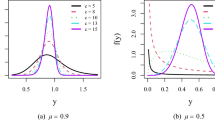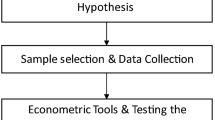Abstract.
We show that there is strong evidence of long-range dependence in the volatilities of several German stock returns. This will be done by applying a method using the difference of the classical log-periodogram regression estimator for the memory parameter and of the tapered periodogram based estimator. Both estimators give similar values for the memory parameter for each series and this indicates long memory. To support our findings we apply also a methodology using the sample variance and a wavelet based estimator to the data. Also these two methods show clear evidence of long-range dependence in the volatilities of German stock returns.
Similar content being viewed by others
Author information
Authors and Affiliations
Corresponding author
Additional information
First version received: December 2001/Final version received: March 2003
The computational assistance of Eleni Mitropoulou and Björn Stollenwerck as well as the helpful comments of two unknown referees are gratefully acknowledged. Research supported by Deutsche Forschungsgemeinschaft under SFB 475. Stock returns were obtained from Deutsche Finanzdatenbank (DFDB), Karlsruhe.
Rights and permissions
About this article
Cite this article
Sibbertsen, P. Long memory in volatilities of German stock returns. Empirical Economics 29, 477–488 (2004). https://doi.org/10.1007/s00181-003-0179-z
Issue Date:
DOI: https://doi.org/10.1007/s00181-003-0179-z




